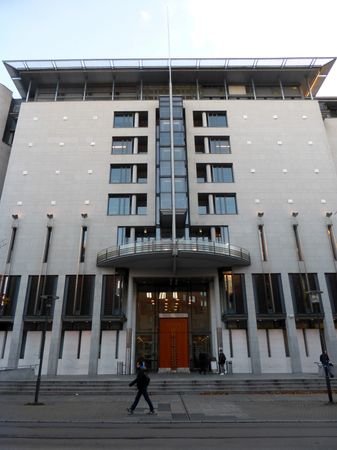By Nora Buli and Isabelle Yr Carlsson
OSLO (Reuters) -A Norwegian man appeared in an Oslo court on Tuesday to face accusations of espionage on behalf of China and will be detained for an initial four weeks, a police official said, in the latest case involving alleged spying by China in Europe.
The man, who was not named, was arrested on Monday by the Norwegian Security Police Service (PST) at Oslo’s Gardermoen airport upon his return from a trip to China, PST said.
“We arrested a Norwegian citizen yesterday morning for what is called serious intelligence activity, benefiting China,” PST lawyer Thomas Blom told reporters after the hearing, which took place behind closed doors.
Blom declined to give details of the case, saying police were in an early phase of their investigation, but said the suspect had “attempted” to spy and that “data-carrying devices” were “particularly relevant” as evidence in the case.
The detained man says he is innocent, his lawyer said. “He rejects the allegations that he is a spy for China,” Marius Dietrichson told Reuters.
The Chinese embassy in Oslo did not comment on the specific case, but said in an emailed statement to Reuters that “certain European countries have fabricated and hyped up so-called “Chinese spy cases”, deliberately smearing and slandering China”.
“Some agencies in Norway have repeatedly made irresponsible accusations without providing concrete facts and propagated the ‘China threat’, which greatly disturbed the normal cooperative atmosphere between China and Norway,” it added.
In its latest annual threat assessment, published in February, the PST said China would pose “a significant intelligence threat” to Norway, a NATO member and close U.S. ally, in 2024 and over the next few years.
“This is mainly due to the deteriorating relationship between China and the West, China’s desire for increased control over supply chains, and positioning in the Arctic,” it wrote.
Anxiety about alleged Chinese spying has mounted across Western Europe in recent months.
Arrests have included an aide to a far-right German member of the European Parliament, three other German nationals in a separate case, and two men in Britain, one of whom was reported to have worked as a parliamentary researcher for a prominent lawmaker in the governing Conservative Party.
In March, the United States and Britain accused Beijing of cyberespionage against millions of people including lawmakers, academics, journalists and firms such as defence contractors.
Chinese officials have rejected the various espionage accusations as “hype” meant to discredit China.
(Reporting by Nora Buli and Nerijus Adomaitis in Oslo and Isabelle Yr Carlsson and Stine Jacobsen in Copenhagen; Writing by Gwladys Fouche; Editing by Mark Heinrich and Emelia Sithole-Matarise)













